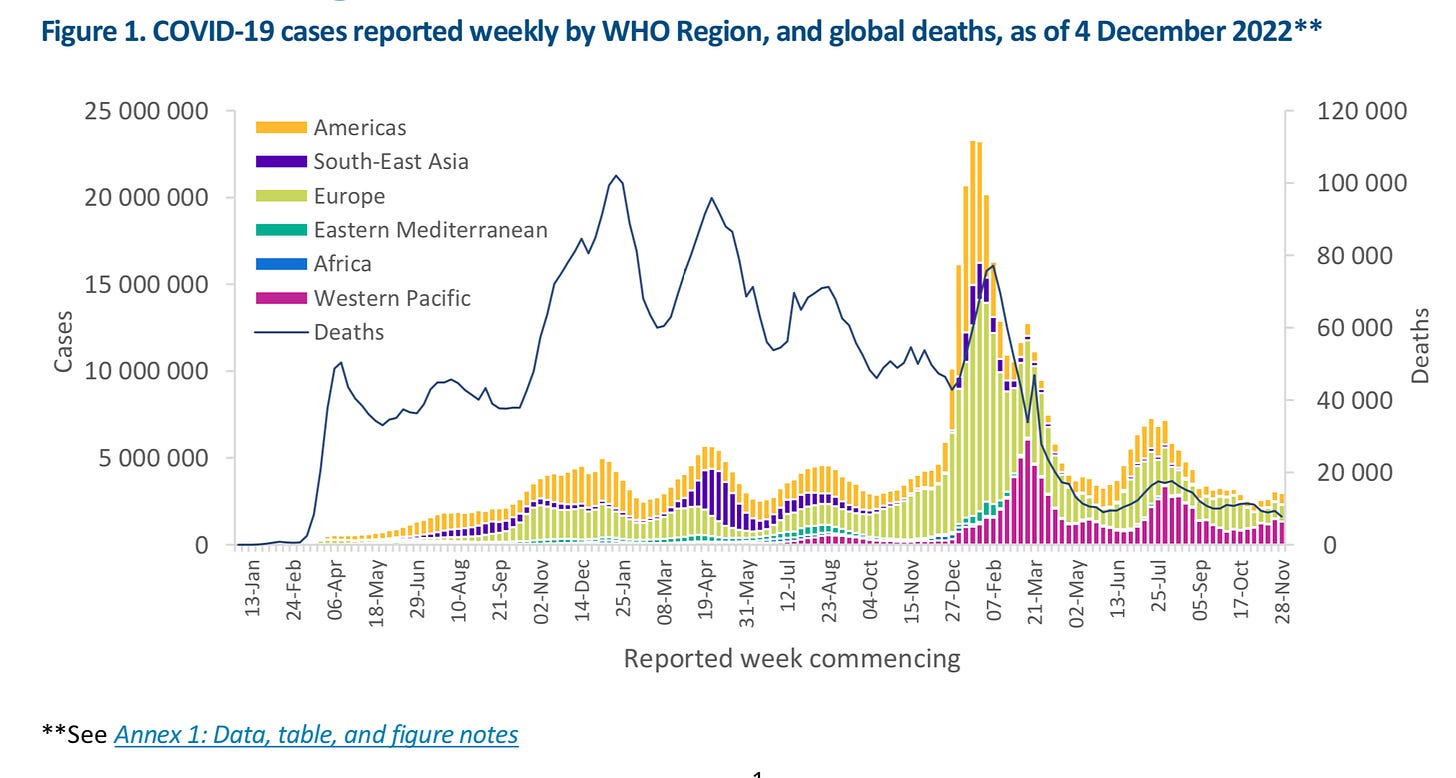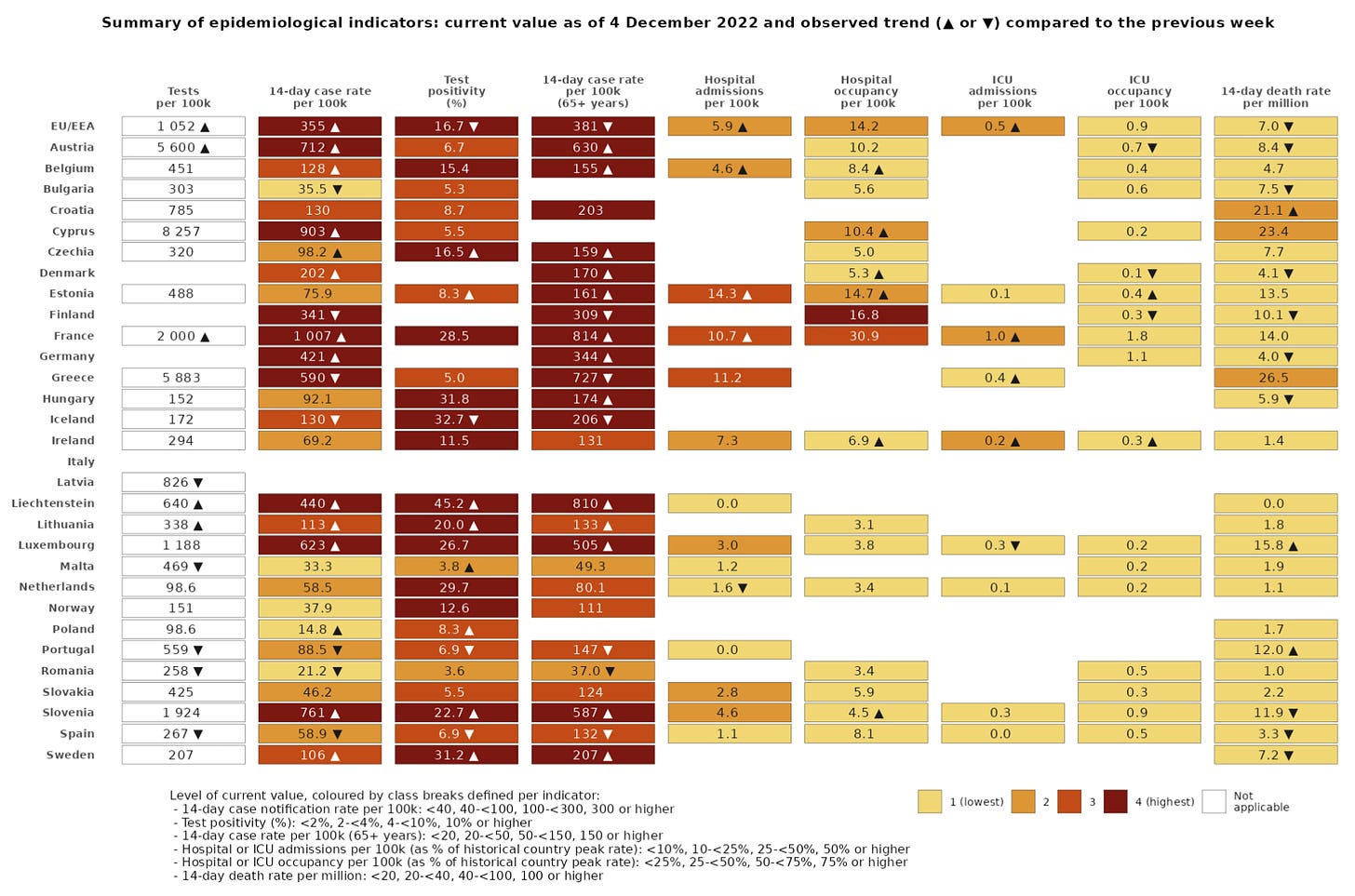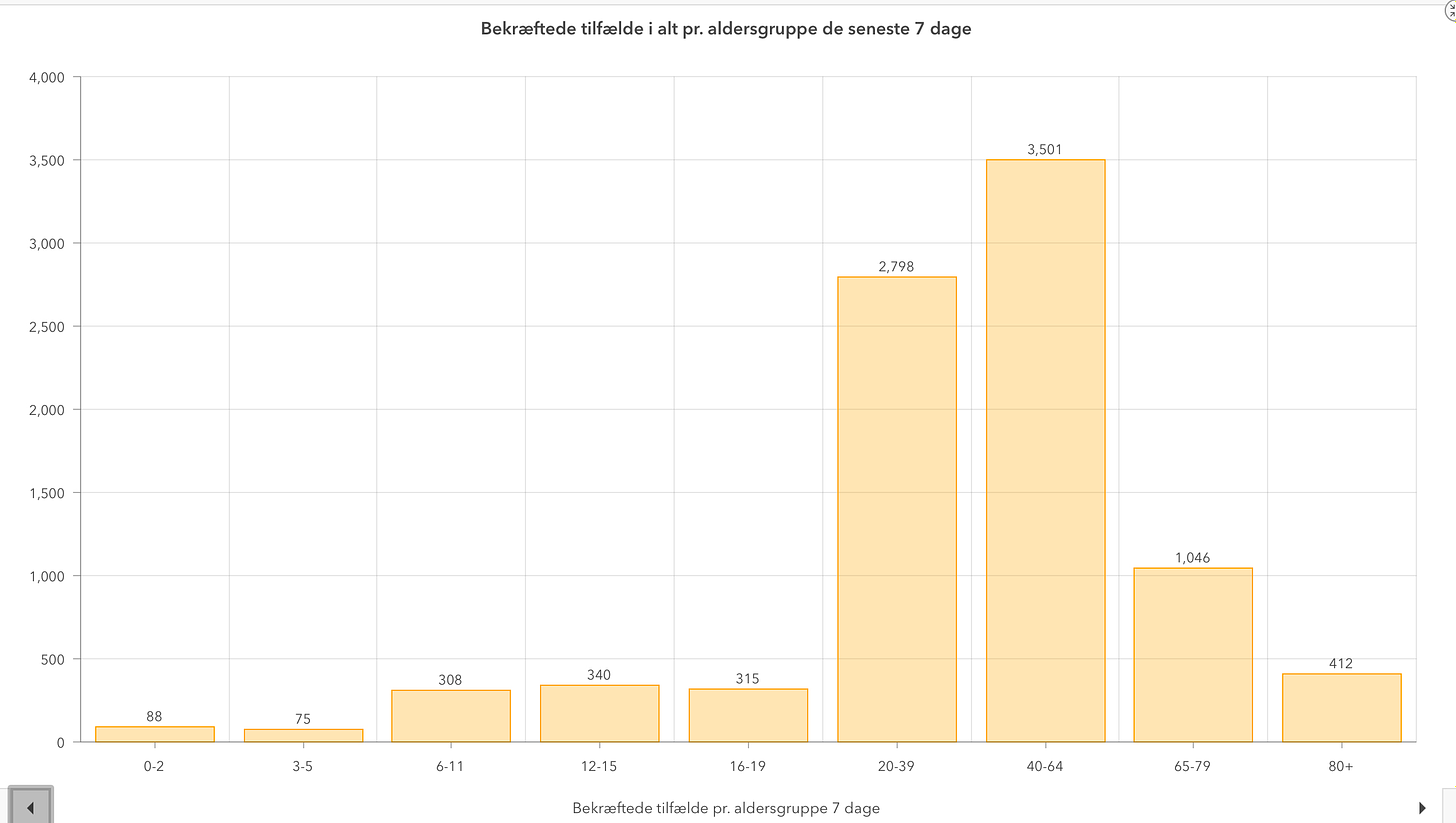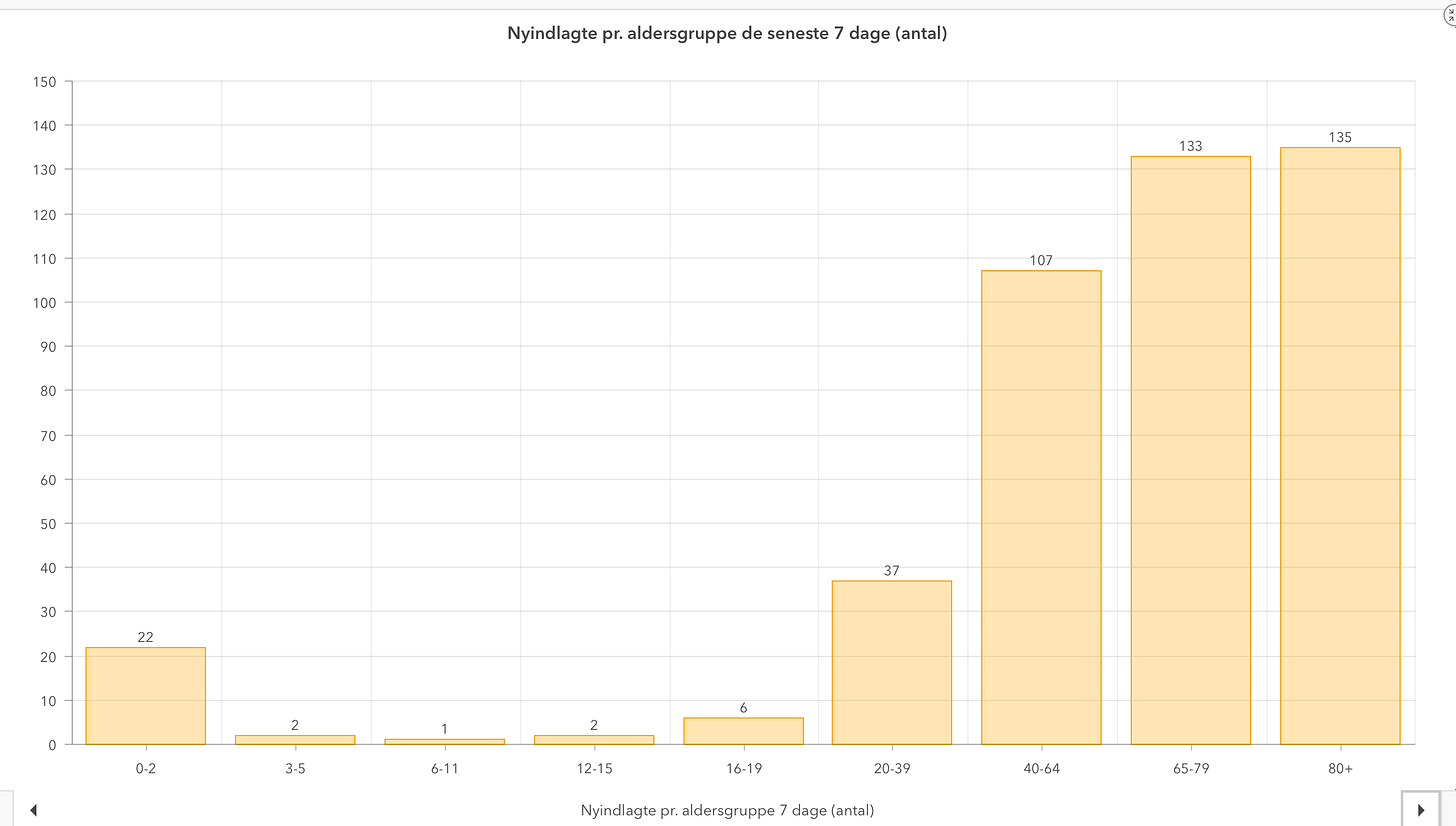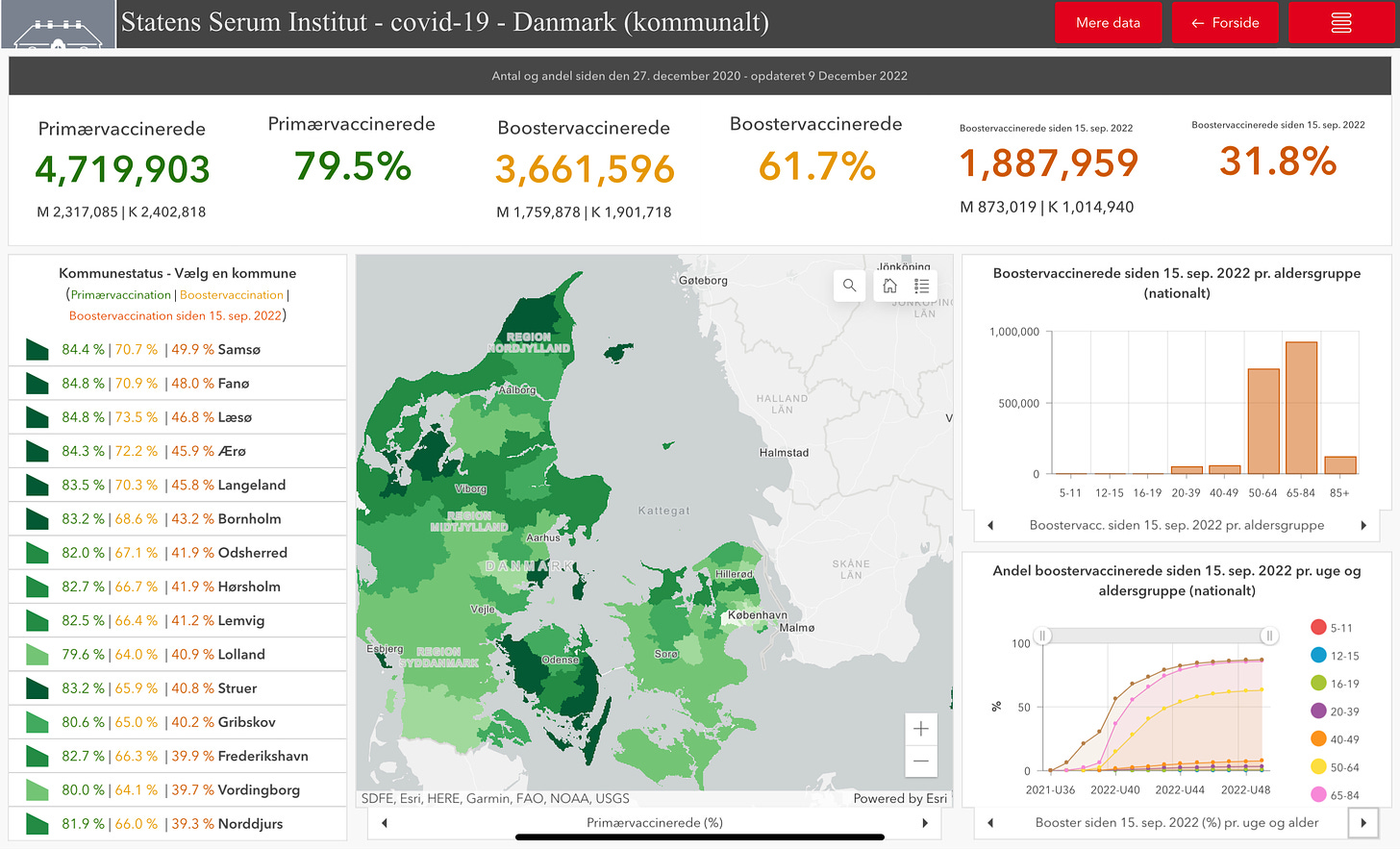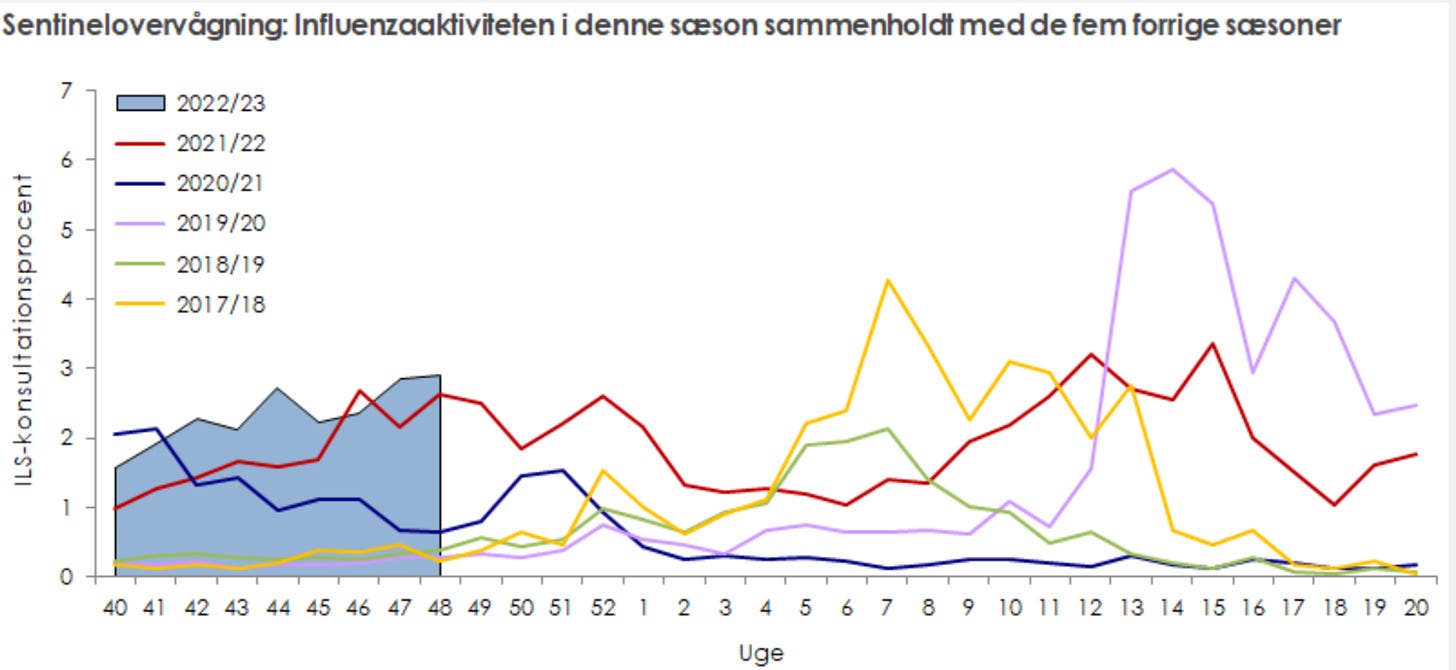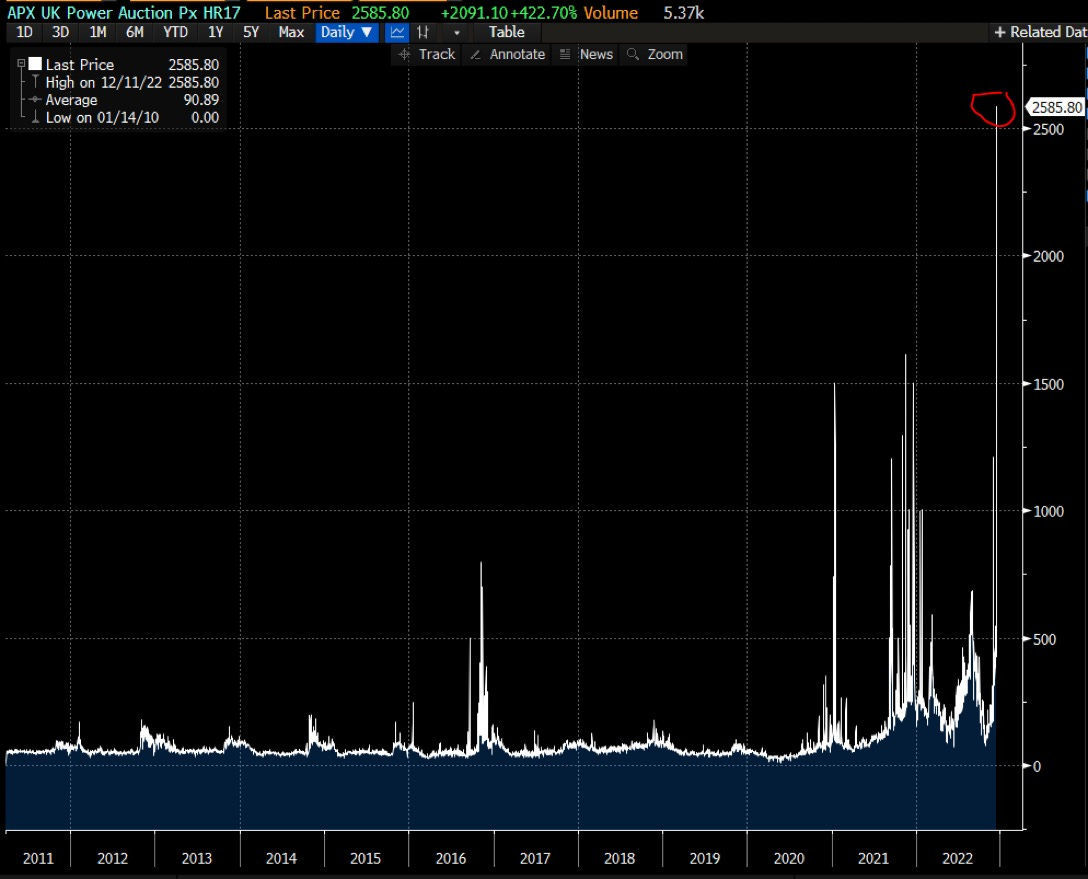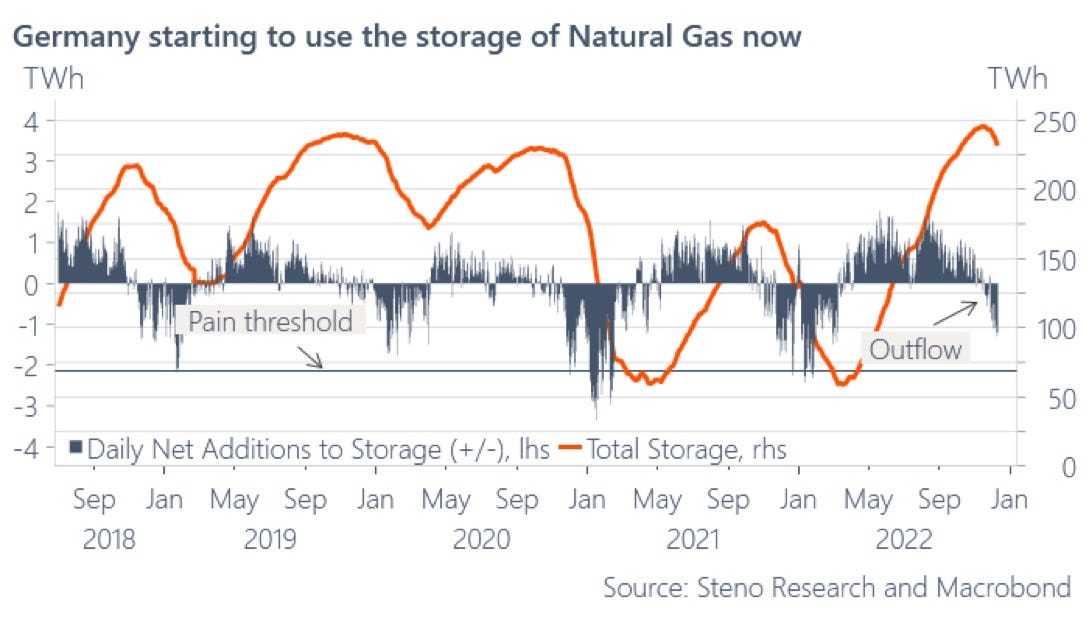Monday Morning News & Notes
BQ.1 variant spreads in Europe. COVID numbers rising fast in Sweden.
🦠Pandemic🦠
🌏🦠
The COVID situation was stable in the week ending December 4, according to the latest global pandemic assessment from the World Health Organization. It says around the world infection numbers, an unreliable statistic, decreased slightly (-3%). While coronavirus deaths continued to plummet, dropping by another 17% week to week. That said, 7,800 more lives were still lost around the globe.
Case numbers were stable or declined in five of the six WHO regions. Declines were steepest in Africa (-78%), followed by South-East Asia (-27%), while Europe saw things more or less remain static (+1%). Only in the Americas did cases rise (+14%).
The African region also saw the largest decline in pandemic deaths (-83%), followed by the Eastern Mediterranean (-33%), while Europe saw deaths fall by 19%. Only South-East Asia saw more pandemic fatalities (+3%) week over week.
Zooming down to the country level, the United States remains a pandemic disaster with 296,333 new cases in the week (-1%) while it saw 1,744 more lives lost (-33%) still the highest number of weekly deaths of any nation on earth. Fanø an had the most new infections again with 749,895 (+7%) followed by France with 385,716 (+38%).
“Current trends in reported COVID cases should be interpreted with caution as several countries have been progressively changing COVID testing strategies, resulting in lower numbers of tests performed and consequently lower numbers of cases detected.“
The WHO pandemic snapshot found that while the BA.5 variant remained dominant globally, the BQ.1 strain continues to grow, accounting for 36.2% of all sequenced positive test results, a growth rate of almost 10% week to week. The variant cocktail also saw the XBB and Ba.2.75 variants gain ground, albeit at a much slower pace than BQ.1. Keep in mind the WHO’s variant reporting is about two weeks behind.
🇪🇺🦠
All the signs point to another COVID wave hitting Europe as numbers, particularly hospital admissions, begin to climb. In the latest weekly pandemic assessment from the European Centre for Disease Prevention and Control, the good news is that infections among vulnerable seniors have continued to drop, by another 3.9% in the week ending December 4. This is likely a reflection of the effectiveness of the booster dose campaign. But, across all age groups infection number, an unreliable statistic, increased by 4% week to week. Zooming in to the country level, 13 European nations registered increasing case counts either across all age groups or among seniors over 65.
That said, pooled positivity percentage eased slightly week to week in the EU, decreasing from 20.5% down to 16.7%. Eight countries are reporting increasing positivity percentages.
Overall, hospital and intensive care admissions rose by 13% and 14% respectively, across Europe week over week. Five EU countries, including Belgium, Estonia, and France, reported increasing numbers in one or both categories. But, while admissions rose, hospital occupancy rates across the EU remained stable. Looking at individual countries, seven nations report increasing hospital occupancy rates. Hospital occupancy in Finland is about 75% of the pandemic peak.
Three countries registered increasing intensive care admissions including France for a 3rd straight week, along with a first week of rising ICU numbers in Greece and Ireland. Two countries, Estonia and Ireland, reported increasing ICU occupancy rates.
COVID deaths, thankfully, continued to trend downward, with not one European country seeing increasing pandemic deaths.
In Europe, 54.4% of the total population has one booster dose, that shoots up to 84.7% among those over the age of 60. Just 11.8% of the total EU population has had a 2nd booster shot; among vulnerable seniors uptake is 29.5%.
Over the next two weeks, the ECDC is forecasting that coronavirus infections and pandemic-related hospitalizations will increase while COVID deaths will remain stable.
With a mere six EU countries testing and sequencing in a high enough number to produce reliable data, it looks like the BQ.1 variant is likely already the dominant strain in Europe as you read this. As of week 47, the week ending November 27, the BQ.1 variant accounted for 42.5% of all coronavirus infections. It is just a shade behind the BA.5 variant, which came back in 48.1% of cases. The rising tide of more immune-resistant BQ.1 is likely helping push this new COVID wave.
🇩🇰
The Statens Serum Institute doesn’t update COVID statistics over the weekend. It will table three days worth of data later today.
-
The COVID pandemic has claimed the life of another child in Denmark. A girl under the age of 10 has died. She is the fourth child to lose their lives in Denmark during the pandemic. According to Sundhedspolitisk Tidsskrift, which is tracking COVID deaths in Denmark, in all four cases, the children had underlying health conditions.
-
Over the last seven days, COVID case trends have remained heavily concentrated in the 20 to 64 year old age groups. We know from the weekly pandemic report that it is really 20 to 49 year olds as infections focus on the age groups immediately outside the booster dose target groups of those 50 years old and older.
-
In the last week, 60% of all pandemic hospitalizations have been seniors 65 years old and older. The percentage jumps to 84% if you include everyone 40 years old and older.
There was also a concerning bump in COVID-related hospitalizations among infants under the age of two with 22 hospital admissions in the last seven days. That is an increase from the 13 in the seven days prior.
-
According to a new Danish study, the COVID pandemic created a new partisan battle line, the vaccinated and the unvaccinated, with one group extremely prejudiced a against the other. The study was conducted across 21 countries, including Denmark, where 500 people in each country were presented with profiles of fake people, some vaccinated and some not, and asked their opinions. The study’s conclusion was that across countries and across cultures, vaccinated people have an extremely negative view of those who are unvaccinated. In fact, the study found vaccinated people had a poorer view of the unvaccinated than they did of immigrants, criminals, and the mentally ill.
Aarhus University Political Science Professor Michael Bang Petersen, who also heads the HOPE project, and helped advise the Danish government of social reactions to lockdowns, restrictions, and other pandemic developments, says he was taken aback by the study’s results.
“It is very surprising that prejudice and the view of the unvaccinated runs so deep, and that it does not go the other way around. The reason fits with previous research, which shows that those attitudes are driven by a psychological reaction, where as a vaccinated person you think that you have contributed with society to solving a common challenge, even if you were worried about side effects and got a pain in the arm. And then you react with anger towards the unvaccinated, because you don't feel that they are doing their share.”
He says the higher the social trust in a country, the harsher the view vaccinated people had of those who were unvaccinated. Denmark is one of those countries.
The study has been published in the science journal Nature. You can find it HERE.
-
The fall vaccination campaign in Denmark has seen over 3.6 million vaccinations administered since it began on September 15. The Danish National Health Board says they are making a big push to get as many people vaccinated as they can before Christmas.
The agency says when it comes to vaccination uptake among at risk seniors, Denmark is a leader among the Nordic nations. 1.9 million people have had a COVID vaccination this fall.
Another 1.6 million have had an influenza vaccination. And 200,000 more have been inoculated against pneumococcal infections.
It says 89% of seniors 85 years old and older have had a 2nd COVID vaccine booster dose, and 80% have had their flu shots. 92% of vulnerable seniors in care have had a 4th COVID vaccine dose and 85% have been vaccinated against influenza. For those 50 to 84 years old 77% have had a 2nd booster dose.
Deputy Director Steen Dalsgård Jespersen:
“We are of course happy about the high level of support for this fall’s vaccination effort. This means that there is generally a good understanding in the population of our recommendation to accept the offers of vaccination, and that overall we have succeeded well with the vaccination efforts.”
But, Jespersen added that with the holiday season approaching, this is not the time to let up.
“We expect to see an increase in influenza and COVID infections over the winter. We therefore recommend that everyone who is eligible to get vaccinated, or who has not yet been vaccinated, make sure to do so in time. Ideally within the next few weeks. It provides the best possible protection in the population against infections.”
-
The Statens Serum Institute is urging people who are eligible for a flu shot to get vaccinated as soon as humanly possible. The institute is growing concerned that an influenza wave is arriving in Europe and could soon sweep through Denmark. It says influenza cases are rising in Germany, the Netherlands, France, Portugal, Spain, Scotland, Romania, Greece, and Malta.
The SSI warns that with COVID cases rising and an extraordinary number of RS virus infections, that adding an influenza wave to the mix could create a “significant burden” on hospitals.
The institute says while influenza vaccination rates are high among seniors (80%) and among nursing home residents (85%), uptake is still much to low among children two to six years old (16%), healthcare staff (21%), and pregnant women (26%).
Ward Doctor Lasse Skafte Vestergaard:
“The free flu vaccination offer continues until mid-January, but it is a good idea to get vaccinated now if you have not already done so. From the day you have had your shot, it is approximately 2 weeks later that the vaccine’s protection reaches full strength."
So far, in the Nordics it looks to be H1N1 and H3N2 flu strains circulating for the most part.
If you are eligible, you can get vaccinated against influenza at your family doctor, at one of the regional vaccination centres, at many of the country's pharmacies, and at various other public and private vaccination clinics.
🇸🇪
The Swedish Public Health Agency updates its COVID statistics once a week every Thursday.
-
The Swedish Public Health Agency held an extremely rare press briefing late last week on the COVID pandemic, taking a break from its usual strategy of ignoring it almost entirely. The news was not good.
Officials said COVID infections are increasing at a “higher level” with cases rising among seniors in care while hospitalizations are also increasing. In fact, the agency says coronavirus activity has increased by a whopping 58% from week 47 to week 48. And the increases are being seen across every age group.
Director Karin Tegmark Wisell:
“We are now at the same levels as we were during week 12 this spring.”
Social Affairs Minister Jakob Forssmed told reporters, as in other European countries, rising coronavirus infections are being complicated by RS virus infections and now influenza activity is also increasing.
“We now have several diseases in circulation that affect healthcare. The spread of the RS virus is at a high level and started record early this year.”
-
With the holiday season approaching, the Swedish Public Health Agency is urging people to do everything they can to avoid spreading infection. This includes staying home if you are sick or symptomatic and especially getting vaccinated.
Director General Karin Tegmark Wisell:
“Right now it is important that anyone who is sick with symptoms of a respiratory infection or has a fever stays at home and avoids close contact with others. That way, we can help reduce the spread of infection. Vaccination is the best way to protect yourself against serious illness and death from both COVID and influenza.”
COVID cases are rising in Sweden. The agency says there is also a “sharp increase” in RS virus infections. Influenza cases are also increasing. It says infections across the board are likely to keep mounting in the weeks ahead. The health agency says this means many people are going to get sick, some so severely they will be hospitalized. It warns both ends of the age spectrum are at risk. Seniors from the coronavirus and infants from the RS virus.
With Christmas around the corner, the agency it is emphasizing how important it is to protect yourself and everyone around you, especially those most at risk, and get vaccinated.
🇩🇪/ 🇨🇳
Germany and China have reached an agreement allowing for the use of different COVID vaccines for each country’s nationals living in the other. What it means is that the Chinese Sinovac vaccine, a far less effective vaccine, can be used to vaccinate Chinese nationals living in Germany. In return, China will allow the use of the Pfizer/BioNTech vaccine to be used, but only for German nationals living in China.
The Chinese government has struggled with unprecedented social unrest due to its strict zero-COVID strategy, which has left the population vulnerable to virus outbreaks with very low immune protection. This has been exacerbated by low vaccination uptake and far less effective vaccines approved for use.
German Health Minister Karl Lauterbach hailed the Chinese decision as opening the door to perhaps accepting more effective mRNA vaccines in the future.
“The fact that China is now allowing German citizens to be vaccinated with the Pfizer/BioNTech mRNA vaccine is an important step. Only with a high vaccination rate with a very effective vaccine is it possible to change the COVID strategy across the board.”
🇨🇦
The first bivalent COVID vaccine for children has been approved for use in Canada. The Pfizer/BioNTech vaccine targeting the original coronavirus strain along with the BA.4 and BA.5 variants was given a green-light by Health Canada for use as a booster rose among children five to 11 years old.
The agency says a thorough review found the bivalent vaccine was safe and effective for use among children. It will be a pediatric dose, so roughly a third of what an adult would be administered. The National Advisory Committee on Immunization (NACI) strongly recommends children with chronic health conditions, those in high-risk groups, especially kids who are immunocompromised to get a booster dose.
-
The province of Saskatchewan is on track to set a new record-high number of pandemic deaths. According to its latest COVID update, the province saw another 41 coronavirus deaths pushing the to-date total this year to 787. Saskatchewan saw a record high 802 fatalities in 2021. Health officials in the province say if the current pace doesn’t let up, 2022 will almost certainly become the deadliest year of the pandemic in Saskatchewan so far.
⚡️Energy Crisis⚡️
🇸🇪
The energy crisis is sinking its teeth into Sweden. An outage at the country’s biggest nuclear power plant is straining energy resources. Swedish Prime Minister Ulf Kristersson says the sudden shortfall dramatically increases the risk of outages.
Sweden will now lean heavily on energy imports from Norway, Germany, and Poland, to get them through the next week.
“The situation is relatively acute, we don’t want to create panic, but it is a serious problem and there are significant risks. Southern Sweden is the area in all of Europe with the least production capacity compared with demand.”
The outage at the nuclear plant combined with cold temperatures and increasing demand has exacerbated the existing energy crisis to test Sweden’s power grid like never before.
🇩🇰
Danish energy company Andel Energi has secured a new deal for natural gas flowing into Europe via Denmark from Norway. It says this will give its 130,000 customers some assurances guaranteeing them gas supplies for this winter and next. The company says it has about 40% of Danish gas customers, so the deal with Norwegian Equinor will also help contribute to security of supply for energy in Denmark.
Andel has traditionally sourced its gas from European markets to Denmark’s south. But, with the freshly constructed Baltic pipeline pumping gas in from Norway, it allows Denmark to diversify its gas supplies. The company is also hoping the deal will help stabilize gas prices that are currently on an energy crisis roller coaster.
-
Thanks to the energy crisis, indoor and outdoor ice rinks are closed this winter in many areas of Denmark. The cost and energy use for maintaining the ice just doesn’t make sense in a winter where energy prices are soaring in energy savings are paramount.
In Copenhagen, Enghaveparken won’t have an ice rink this winter. The ice rink at Frederiksberg Runddel has also been shuttered. The same goes in Aarhus, at the rink in the music park, and at the rink at Jens Otto Kraghs Plads in Randers. It is a similar story in Middelfart, Esbjerg, and Horsens.
🇬🇧
UK wholesale electricity prices have skyrocketed. Bloomberg energy and commodities columnist Javier Blas says prices on the day-ahead market, so the peak period of late afternoon and early evening Monday, have hit £2,585 per megawatt hour. That is roughly 45 times what the average market price was in 2011 to 2020.
Blas says the spike could be short-term and might improve by Tuesday and Wednesday.
The impacts aren’t just in the United Kingdom as the energy crisis pain is also spilling over to European markets. The reason why is calm, dry, and cold weather. This draws heavier on fossil fuel energy production sources while wind energy lags. Market prices aside, it also means EU countries are having to lean a lot more on precious gas reservoirs. Germany for example, is flirting with unsustainable outflows from its gas reserves. If its current pace holds, and Old Man Winter continues to keep things in a deep freeze, Germany might run out of gas reserves sometime in March.
On the positive side, French nuclear power is beginning to pick up production and it couldn’t come at a better time in shoring up European energy supplies and providing some kind of counter-force to soaring market prices.
Long story short, Europe is not out of the energy crisis yet and won’t be for a few months yet.
🇩🇪
Germany has been one of the hardest hit nations in the energy crisis as it relied heavily on cheap Russian gas. With Russia turning the taps off as it weaponizes its energy exports in a bid to bring Europe to heel, Germany has been scrambling to seek energy supplies elsewhere. While it has struck deals with countries like Qatar and Canada for LNG, it lacks the terminals to offload inbound LNG tankers. So a simultaneous race to build infrastructure has also begun. But, it has almost as quickly run into serious roadblocks.
Germany has rented out five floating LNG terminals, and has plans to build its own, but costs have tripled reaching almost €10 billion euros.
It also plans to build its own onshore LNG terminals but there too, challenges abound including dealing with tonnes of World War II munitions littering the Baltic and North Sea floor that will have to be dealt with. You can get a handle on this dire problem and the environmental threat it poses in a video I produced for the North Sea Region. 👇
🇺🇦/ 🇷🇺 War
🇳🇴 🇺🇦
Norway is providing one billion Norwegian kroner (about $136 million Cdn) to help rebuild and restore Ukraine’s heavily damaged infrastructure. The monies will be channeled to Ukraine through the World Bank’s Ukraine Relief, Recovery, Reconstruction, and Reform Trust Fund.
🇳🇴/ 🇷🇺
The son of a Russian businessman who is close to Russian President Vladimir Putin has been acquitted of charges related to flying a drone in Norway. Since the Russian invasion of Ukraine, Norway has made it illegal for Russian nationals to fly drones on Norwegian soil. 47-year-old Andrey Yakunin, who holds both a Russian and British passport, was arrested in October. But, a judge acquitted him of charges ruling that the law does not apply to hobby drones.
Yakunin is the son of 74-year-old Vladimir Yakunin, who is a businessman and former head of the Russian Railways. He is part of the so-called Ozero collective, which consists of people with close ties to Putin.
🇷🇺/ 🇫🇮
There are reports that a Russian flag was burned during Finland’s Independence Day celebrations on December 6 according to Yle. Russia is seizing on the news and demanding Finland “take responsibility” for the “unacceptable” act. In Finland, it is only a crime to destroy, disparage, or disrespect a Finnish flag.
🇸🇪 🇫🇮 🇩🇰 🇳🇴 🇮🇸/ 🇺🇦
A new report from the United Nations High Commissioner for Refugees (UNHCR) has put a number on the Ukrainian refugee wave that fled into Europe after the Russian invasion. It says in the last nine months more than 165,000 Ukrainians have poured into Europe, applied for, and received temporary protections, to seek safety from the war. This number is likely an underestimation, not being able to take into account Ukrainians who didn’t apply for some kind of asylum and either returned home after a while or left Europe for other countries abroad.
Among the Scandinavian countries, Sweden has taken in the most Ukrainian refugees providing asylum to about 47,000 of them. It is followed by Finland who took on 43,000; then Denmark with 34,700; Norway gave protections to 31,000, and Iceland 1,700.
🇷🇺/ 🇨🇦
Russia has levied tit for tat sanctions against another 200 Canadians in response to a new batch of sanctions from the Trudeau government. On the list this time are a number of current and former federal and provincial politicians like former Liberal turned independent MP Jody Wilson-Raybould and former Liberal MP Catherine McKenna. Also on the list is new B.C. Premier Dave Eby and the Chief and Deputy Chief of the Vancouver Police Department, Adam Palmer and Howard Chow.
You can see the full list HERE.




